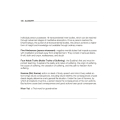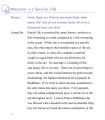life consequences : ค้นหาหนังสือธรรมะ
หน้าหนังสือทั้งหมด

155
Reflections on Death: Cultivating Merit and Purpose in Life
do not know when we are going to die. We must sooner or later be separated from all loved ones and treasured things.
How can people think about death?
1. Thinking about death with the false view: Th
In contemplating death, there are varied perspectives. The false view neglects merit and life’s purpose, while the right view emphasizes the importance of good deeds before we die. Life’s ultimate goa

155
Understanding Death and the Purpose of Life
do not know when we are going to die. We must sooner or
later be separated from all loved ones and treasured things.
How can people think about death?
1. Thinking about death with the false view: Thin
This text explores the dual perspectives on death: one as a mere inevitability leading to despair, and the other as a motivator for a purposeful life. It emphasizes the cultivation of good deeds and m

45
Understanding Kamma and Good Deeds in Buddhism
child to be born to her. When someone from a fortunate realm
is ready to be reborn, he will choose the best and most generous
mother. Once he enters the womb, he brings good fortune to
his mother and
This text discusses the concept of kamma and the importance of performing good deeds for future happiness. It emphasizes that an unborn child's merits can influence their mother to perform acts of kin

45
The Birth of a Meritorious Person
child to be born to her. When someone from a fortunate realm
is ready to be reborn, he will choose the best and most generous
mother. Once he enters the womb, he brings good fortune to
his mother and
The text discusses the relationship between an unborn child and their mother's well-being, highlighting how the child's past good deeds influence the mother's experiences, such as morning sickness. It

125
Understanding Key Buddhist Concepts
"Fools" (palay): spiritually defective people. A fool is someone wicked, weak, or feeble in a moral sense. His discretion is faulty, not knowing right from wrong, good from bad. A fool is one who give
This content delves into various Buddhist concepts such as 'fools'—spiritually defective individuals whose actions reflect moral weakness. It explains that heaven in Buddhism comprises six levels prov

160
Understanding Transcendental Inner Bodies and Meditation
individual person possesses 18 transcendental inner bodies, which can be reached through advanced stages of meditative absorption. Once a person reaches the Dhammakaya, the purest of all transcendenta
This text discusses the concept of 18 transcendental inner bodies accessed through advanced meditation, reaching the Dhammakaya for profound insights. It also covers the Five Hindrances, which are neg

12
Understanding Self-Worth and the Consequences of Actions
self-worth. Human life can only occur with a man and
a woman, but should only be when it is appropriate.
Promiscuity, illicit affairs and sexual violations can
lead to deceit and abortions, which in t
This content discusses the critical relationship between self-worth and the choices people make concerning intimacy and sexuality. It points out that human life is sacred and should only be pursued wi

194
Understanding Merit in Buddhism
should think in this way. As long as the monks do not seriously
break the monastic discipline, you should think that you are
giving alms to them to replenish their energy for Dhamma
study and meditati
This text emphasizes the importance of giving alms to monks to replenish their energy for Dhamma study and meditation. It advises that both givers and receivers gain merit. It discusses the impact of

194
Negative Effects of Misinterpreted News on Understanding Buddhism
Negative circumstances resulting from carelessly reading negative news
If parents do not teach their children to thoroughly analyze the truth in articles about monks, the children may thoughtlessly b
Neglecting to teach children how to analyze negative news about monks leads to misconceptions and misunderstandings about Buddhism and the law of Kamma. When children generalize that all monks are mor

94
Understanding Merit and Demerit: The Law of Karma
The opposite of merit is demerit, or ‘sin’. Demerit is the product of bad deeds. Bad deeds cause ‘bad karma’. Demerit is a negative energy that is created when a bad deed is performed: mentally, bodil
The opposite of merit is demerit, representing the consequences of bad deeds which cause negative karma. Both good and bad deeds are governed by the Law of Karma, where actions determine outcomes in t

32
Lessons from Buddha: Stability of the Mind
Base on this truth, whether we are content or not, as
humans, we must learn to have calm and unwavering minds,
not to be frightened of life's uncertainties, and know how to
remain alert, like the eart
This text reflects on the teachings of Buddha regarding the importance of maintaining a calm and unwavering mind in the face of life's uncertainties. Buddha taught Venerable Rahula that like the earth

120
Buddhism and the Understanding of Life
This question has prompted me to study Buddhism
seriously, which has given me an understanding of life:
1. Death is not the end. We still have to be reborn
indefinitely, as long as we have not rid our
The text reflects on serious studies of Buddhism and how its teachings on rebirth, karma, and consequences of actions shape a more meaningful life. It emphasizes the importance of performing good deed

123
The Great Refuge of Humankind: Understanding the Teachings of the Lord Buddha
1. The mentor should have an unambiguous
biography. There must be proof of his life history; it can not
be vague and unreliable.
2. He must be extremely intelligent, exceptionally
virtuous, exceedingl
This text examines the criteria for an exemplary mentor, using the Lord Buddha as a prime example. It highlights the importance of a well-documented biography, exceptional knowledge, and the ability t

42
Understanding Kamma and Family Life
Part One: Family Life
The fact that people all are born humans, but vary in the
amount of happiness or dukkha (suffering) is an indication
that the fruits of Kamma exist and their retribution is deriv
In this text, the relationship between Kamma and the varying levels of happiness or suffering (dukkha) among humans is examined. With insights from the Buddha's teachings, it emphasizes that our curre

36
TEN RIGHT VIEWS: A Path to Generosity and Understanding Kamma
TEN RIGHT VIEWS
1) Generosity Bears Fruit
The first step of your training is learning to give up something of which you have more than you need and to give to someone whom you love or for whom you car
This text outlines the ten right views that promote a deeper understanding of generosity, respect, and the consequences of one's actions in light of Kamma. Starting with generosity, it emphasizes the

154
Confronting Life's Inherent Sufferings
"Even though we may dislike difficulties and welcome
happiness, there is no way to avoid suffering in our lives
because life is a mixture of suffering and happiness. Instead,
we should prepare for the
This text discusses the duality of suffering and happiness in life. It emphasizes the natural forms of suffering such as aging, sickness, and death that everyone faces. Many people distract themselves

24
Monastic vs Secular Life: Insights from Buddhism
Monastic v.s Secular Life
Monica
Luang Por
24
: Good, thank you. What do the monks think about
family life? And do you consider family life to be a
distraction from your faith?
: Family life is restri
In this discussion, monks explore the contrasting paths of monastic and secular life. Family life, likened to a fish in a tank, is seen as restrictive, potentially obstructing the journey towards Arah

32
The Importance of a Calm Mind in the Face of Uncertainty
Base on this truth, whether we are content or not, as humans, we must learn to have calm and unwavering minds, not to be frightened of life's uncertainties, and know how to remain alert, like the eart
This content emphasizes the importance of maintaining a calm and unwavering mind amidst life's uncertainties. Drawing from the teachings of the Lord Buddha to Venerable Rahula, it illustrates the need

14
Analysis of the Root Causes of Life’s Problems
Analysis of the Root Causes of Life’s Problems
The Root Causes of Life’s Problems
Economic Problems Conflicts Defilements
Buddhism
The Individual
The Mind
Habits
Root Causes of Life’s Problems
This text discusses the analysis of life’s problems through a Buddhist lens, identifying economic issues, conflicts, and personal defilements as root causes. It asserts that these problems originate f

197
The Supreme Wisdom of the Lord Buddha
Since we must seek refuge in our own wisdom in times of sorrow and happiness, we can appreciate that the Lord Buddha’s supreme wisdom (of how to lead one’s life) is indeed comparable to none. His pure
In times of sorrow and happiness, the wisdom of the Lord Buddha guides us on how to live right. His teachings illuminate the causes of life’s vicissitudes, emphasizing the Law of Kamma, where good or
